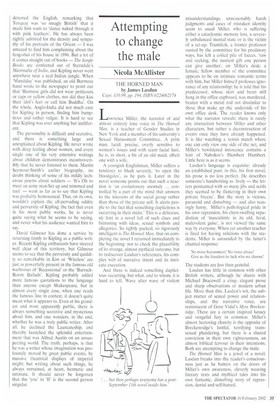Attempting to change the male
Nicola McAllister
THE HORNED MAN by James Lasdun
Cape, £10.99, pp. 194, ISBN 0224062174
L
awrence Miller, the narrator of and almost entirely lone voice in The Horned Man, is a teacher of Gender Studies in New York and a member of his university's Sexual Harassment Committee. A prim man, lucid, precise, overly sensitive to women's issues and with scant facial hair, he is, in short, a bit of an old maid, albeit one with a wife, A youngish Englishman. Miller suffers a tendency to blush severely, 'to open the bloodgates', as he puts it. Later in the novel someone points out that such a reaction is 'an evolutionary anomaly ... controlled by a part of the mind that answers to the interests of the social group rather than those of the private self. It alerts people to the fact that something duplicitous is occurring in their midst.' This is a delicious, sly hint in a novel full of such clues and brimming with ideas, sexual symbols and allegories. So tightly packed, so rigorously intelligent is The Horned Man, that on completing the novel I returned immediately to the beginning: not to check the plausibility of its strange, almost mythical outcome, but to rediscover Lasdun's references, his complex web of narrative intent and its intricate execution.
And there is indeed something duplicitous occurring, but what, and to whom, it is hard to tell. Wave after wave of violent misunderstandings, unreasonably harsh judgments and cases of mistaken identity seem to assail Miller, who is suffering either a cataclysmic memory loss, a severely unbalanced mental state or is the victim of a set-up. Trumilcik, a former professor ousted by the committee for his predatory ways, has left a coiled pile of faeces, 'raw and reeking, the nastiest gift one person can give another', on Miller's desk; a female, fellow member of the committee appears to be on intimate romantic terms with him, but Miller himself professes ignorance of any relationship; he is told that his predecessor, whose skirt and beret still hang in the office cupboard, was murdered, beaten with a metal rod not dissimilar to those that make up the underside of his own office desk. The reader knows only what the narrator reveals; there is rarely any interaction between Miller and other characters, but rather a deconstruction of events once they have already happened. It is like watching a tennis match where one can only view one side of the net, and Miller's bewildered innocence contains a hint of Nabokov's Humbert Humbert. Little here is as it seems.
Lasdun's language is exquisite: already an established poet, in this, his first novel, his prose is no less perfect. He describes someone's handwriting as lively — the letters pennanted with so many jibs and serifs they seemed to be fluttering in their own private breeze'. But the story is vicious, paranoid and disturbing — and also teasingly funny. Miller's pathological pride in his own repression, his chest-swelling repudiation of 'masculinity in its old, feral, malevolent guise', is not viewed the same way by everyone. When yet another teacher is fired for having relations with the students, Miller is astounded by the latter's chanted response:
No more harassment! No more abuse!
Give us the freedom to fuck who we choose!
The students are less than grateful.
Lasdun has little in common with other British writers, although he shares with Michael Bracewell a crisp, elegant prose and sharp observations of modern urban life. More than this, Lasdun's wit, the subject matter of sexual power and relationships, and the narrative voice, are reminiscent of Gore Vidal's Myra Breckenridge. There are a certain inspired lunacy and vengeful fury in common. Miller's almost hectoring chastity is the opposite of Breckenridge's lustful, terrifying transsexual plundering, but there is a shared conviction in their own righteousness, an almost biblical fervour in their intentions. Both are attempting to change the male, The Homed Man is a jewel of a novel. Lasdun breaks into the reader's consciousness just as he batters on the doors of Miller's own awareness, cleverly weaving literary texts and mythical tales into his own fantastic, disturbing story of repression, denial and self-hatred.




































































 Previous page
Previous page